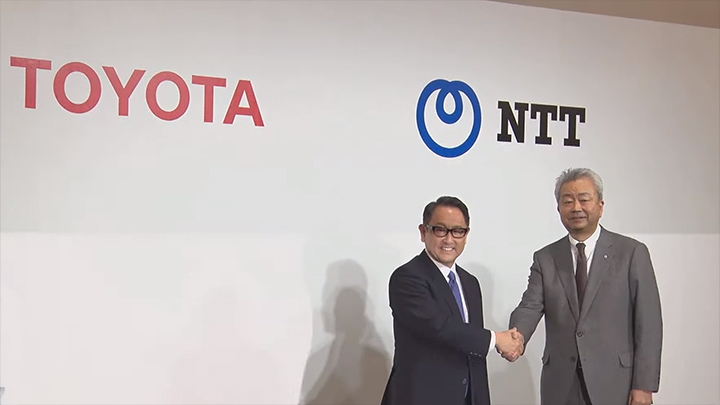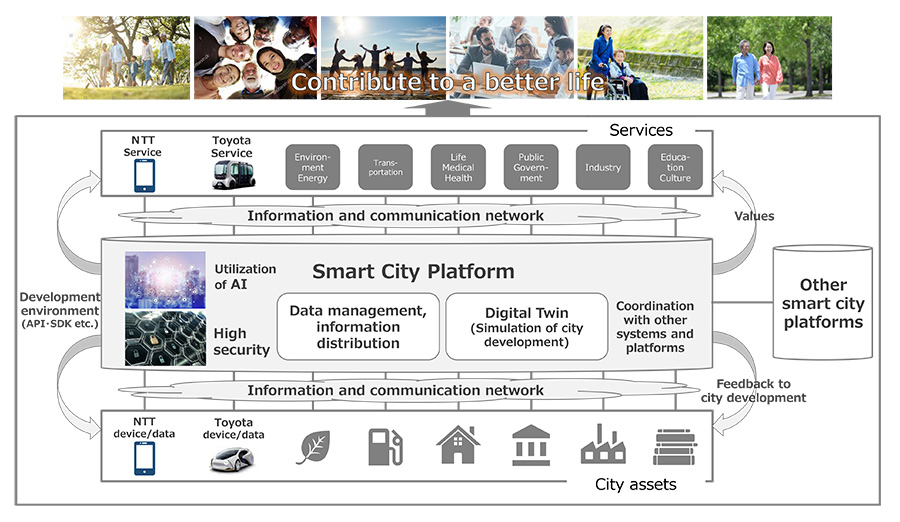
Toyota Motor Corporation has recently signed a joint venture with Japanese telco giant NTT Corporation to run and build future smart cities.
The saying “if you want something done right, do it yourself” rings true, but for herculean goals such as building a prototype smart city, then you’ll have to seek all the help you need. Toyota Motor Corporation and NTT Corporation announced that they have entered into a memorandum of understanding (MoU) today.
The purpose of the MoU is to build a long-term and cooperative relationship that enables the commercialisation of smart city businesses with each company being a core partner sharing the same values and to promote social development.
Toyota is fully aware that the automotive industry is undergoing a major transformation mostly influenced by stricter environmental and safety regulations are enforced, while new and advanced technologies, entrance by other industries – like how Sony is making cars – and the diversification of the mobility business.
Likewise, the telecommunications market are moving forward at a blistering pace due to the rapid development of cloud services, the Internet of Things (IoT), big data, AI, Information and Communications Technology (ICT), and many more.
The two companies have been working on a couple of projects together since and both Toyota and NTT understood that is necessary to build cooperative relations between them and seek further strengthen the business foundation they have been cultivating to date.
I believe that NTT is a partner who can best put to use cars that are incorporated into the societal system. That is because NTT’s operations are directly connected to the creation of society. The various forms of infrastructure that construct society are supported by the information infrastructure that NTT provides.
Akio Toyoda, President, Toyota Motor Corporation
The two companies have begun projects related to smart cities, which various problems can be solved by improving efficiency and adding refinement to functions and services in cities and regions. These include the utilisation of advanced technologies, the creation of new revenue streams as well as comfort and convenience, and other areas of importance which may arise in the near future.

Announced at CES 2020, Toyota’s prototype city project named “Woven City” will connect all kinds of goods and services, including transportation and infrastructure to support people’s lives.
The project is set to be built on Toyota Motor East Japan’s 175-acre soon-to-be-defunct Higashi Fuji Plant at the tail end of 2020. Toyota says that the company will have to move confirmation initiatives forward in coordination with various partner companies and researches toward the creation of the new city.
Woven City will serve as a “living laboratory” for both companies to apply, learn and improve upcoming technologies such as autonomous vehicles, hydrogen power storage and in-home robotics. NTT meanwhile is collaborating with Fukuoka, Sapporo, Yokohama, Chiba and other local governments as well as companies to address various city and community matters.
And as announced in December 2018, with various traffic data collected from Las Vegas the city is able to predict incidents and accidents through the utilisation of advanced AI, IoT and ICT resources. Furthermore, the NTT Group is promoting initiatives for the deployment of such practices in other cities.
The platform consists of smart-city data management and information distribution, the city’s real-time virtual simulation to provide feedback, and network functions linking with various devices, hardware, services as well as other smart city platforms. Basically, the Smart City Platform will be interwoven into future society’s everyday lives.
Furthermore, the Smart City Platform will consist of a “platform on platforms” for individual smart cities and for linking with other smart cities.
Toyota says that the Smart City Platform will add value to all facets of life including cars, houses, daily activities, businesses, infrastructure and public services. The new platform will be implemented in the Higashi-Fuji area of Susono City, Shizuoka Prefecture (Woven City) and in the Shinagawa areas in Minato-ku, Tokyo. Following after, the platform will be introduced to other cities in succession.
In the future, Toyota and NTT aim for further growth through the enhancement of the competitiveness of smart cities and the development of a sustainable society.
There’s no word whether Kuala Lumpur will become a smart city, but we could see it happen within our lifetimes. But for now, you can find a hybrid or other Toyota vehicles here. And if you’re thinking of making the change, you can sell your car, bike or truck by registering or by logging in here.